Through The Wall Bathroom Exhaust Fan
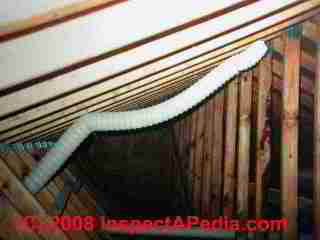 Bathroom Ventilation Fan Duct Lengths
Bathroom Ventilation Fan Duct Lengths
What are the maximum & minimum recommended lengths for bath vent fan ducts?
- POST a QUESTION or COMMENT about bathroom vent fan and fan ducting installation procedures, codes, standards
InspectAPedia tolerates no conflicts of interest. We have no relationship with advertisers, products, or services discussed at this website.
Bathroom exhaust fan duct length specifications:
Here we provide specifications for recommended minimum & maximum duct lengths for bathroom vent fans. A bath vent fan duct that is too short may violate the manufacturer's installation instructions, may not work properly, or may be drafty; a bath vent fan duct that is too long may restrict air flow such that the fan is not functional.
This bath vent fan installation, troubleshooting, repair article series explains why bathroom vent fans are needed and describes good bath vent fan choices, necessary fan capacity, and good bath vent fan and vent-duct installation details.
We also provide an ARTICLE INDEX for this topic, or you can try the page top or bottom SEARCH BOX as a quick way to find information you need.
Bathroom Vent Fan Duct Length Guidelines & Specifications
Question: what is the maximum horizontal bath vent fan duct length through an attic?
You note for the best bath vent fan duct termination to route the duct: horizontally through the building wall at a building gable-end wall (first choice), or if the gable end is too distant ... . what is a distance the would be within you recommendation?
Reply: Bathroom Vent Fan Vent Ducting Installation Advice Details from InspectAPedia
Our bath vent fan duct installation photo shows use of solid metal 4" ductwork conducting the fan exhaust to an outdoor soffit under a cathedral ceiling roof.
Following the sloping roof/ceiling and exiting into the soffit, this fan vent duct slopes down away from the vent fan which you can just see in the photo upper right corner.
The ceiling cavity was later filled with solid foam insulation (second photo below).
Any condensate in the ductwork drips to outside - a possible winter icing worry, but because of the solid foam insulation there should be little condensation in the fan duct. Also we insulated the full outdoor soffit bay where the duct exits the building to avoid condensate icing.
Take a look at the vent fan installation manual for the particular bathroom vent you are installing.
Because bath and kitchen vent fans vary in their power, the length of the vent ducting could provide enough airflow resistance to a small vent fan that it would not work properly.
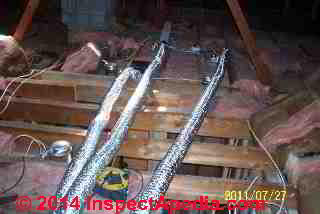
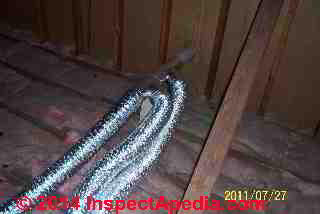
In our photographs above, courtesy of Galow Homes, three long, un insulated bathroom exhaust fan ducts cross the cold attic floor of a New York home and then join together at a common sidewall exit of the same diameter.
There is little chance that these bath vents will work effectively and a good chance of pooling condensate in the low spots of the duct run.
Table M1507.4 Prescriptive Exhaust Duct Sizing
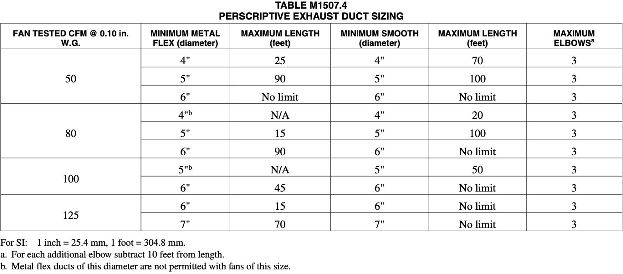
[Click to enlarge any image]
Watch out: be sure to see the details of duct length limits given just below on this page. For higher CFM exhaust fans and for longer runs, you will need to use a larger-diameter exhaust duct than the 4-inch minimum.
Sources:
IRC RESIDENTIAL SPECIALTY CODE - CHAPTER 15 EXHAUST SYSTEMS 2017 FLORIDA [PDF] modeled from the International Residential Code or IRC
IRC RESIDENTIAL SPECIALTY CODE - CHAPTER 15 EXHAUST SYSTEMS 2011 OREGON [PDF] modeled from the International Residential Code or IRC
The bath vent fan installation manuals we reviewed did not specify a maximum exhaust duct length, they just say route the duct to the outdoors
. If you contact your bath vent fan manufacturer directly and speak with a technical support contact, s/he should be able to give you a maximum recommended exhaust duct length for their fan model.
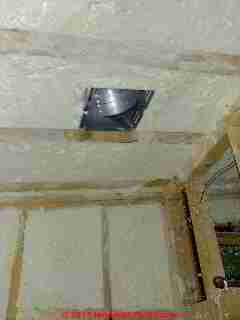
We haven't yet found a bath vent fan manufacturer's spec nor building code or ASHRAE specification limiting the horizontal run length for bathroom vent fan ducting, perhaps because the normal size of residential buildings means that the duct run length will be within the operating capacity of currently-sold bath vent fans.
But we do have some specific suggestions for a good bath fan vent duct installation and some duct length specifics as well:
Maximum & Minimum Bath Exhaust Fan Duct Length
Maximum Bathroom Exhaust Duct Length
Watch out: there is no one right answer to "how long can I make my bath exhaust vent duct run?" is that ... it depends on
- The fan model (its size and CFM rating) or the required or "design" flow rate in CFM (from your local code, such as 60 or 80 CFM).
Watch out: Industry experts recommend 60 cfm to 80 cfm for small bathrooms and 200 to 300 cfm for a large bathroom with a steam generator.
- The vent material (smooth vs. corrugated or worse)
- The vent diameter
- The number of elbows required along th vent duct path
- The installation instructions provided by the fan manufacturer. Note that the 2018 International Residential Code for One- and Two-Family Dwellings requires that
Vents must be installed according to the vent manufacturer.
- The actual exhaust venting distance between the exhaust fan and the building exterior point of termination
The exhaust vent must comply with local codes that in turn are typically adopted versions of
The 2015 IRC Section M1506.2 or the 2018 IRC Section M1504.2 (ft)
So we need to know the Brand and model of the exhaust fan and then to look at that manufacturer's specific installation instructions (that will include duct length and length-equivalent numbers for each elbow or bend)
Code Table M 1506.2 Duct Length
The length of exhaust and supply ducts used with ventilating equipment shall not exceed the lengths determined in accordance with Table M1506.2.
Exception: Duct length shall not be limited where the duct system complies with the manufacturer's design criteria or where the flow rate of the installed ventilating equipment is verified by the installer or approved third party using a flow hood, flow grid or other airflow measuring device.
IRC Table M 1506.2 Duct Length | ||||||||||||||||
| Duct Type | Flex-Duct | Smooth-Wall Duct | ||||||||||||||
| Fan Airflow Rating CFM a | 50 | 80 | 100 | 125 | 150 | 200 | 250 | 300 | 50 | 80 | 100 | 125 | 150 | 200 | 250 | 300 |
| Duct Diameter b in Inches | Maximum Duct Length in Feet c d e | |||||||||||||||
| 3 | X | X | X | X | X | X | X | X | 5 | X | X | X | X | X | X | X |
| 4 | 56 | 4 | X | X | X | X | X | X | 114 | 31 | 10 | X | X | X | X | X |
| 5 | NL | 81 | 42 | 16 | 2 | X | X | X | NL | 152 | 91 | 51 | 28 | 4 | X | X |
| 6 | NL | NL | 158 | 91 | 55 | 18 | 1 | X | NL | NL | NL | 168 | 112 | 53 | 25 | 9 |
| 7 | NL | NL | NL | NL | 161 | 78 | 40 | 19 | NL | NL | NL | NL | NL | 148 | 88 | 54 |
| 8 & Above | NL | NL | NL | NL | NL | 189 | 111 | 69 | NL | NL | NL | NL | NL | NL | 198 | 133 |
Notes to the table above:
Adapted from IRC Code Table M 1506.2 Duct Length [image file] retrieved 2019/10/02 original source https://up.codes/s/exhaust-ducts-and-exhaust-openings
a. Fan airflow rating is in cubic feet per minute or CFM at 0.26 inches wc - water column Fan airflow rating shall be in acordance with ANSI/AMCA 210-ANSI/ASHRAE 51.
b. For noncircular ducts, calculate the diameter as four times the cross-sectional area divided by the perimeter.
c. This table assumes that elbows are not used. Fifteen feet of allowable duct length shall be deducted for each elbow installed in the duct run.
d. NL = no limit on duct length of this size.
e. X = not allowed. Any length of duct of this size with assumed turns and fittings will exceed the rated pressure drop.
For SI: 1 foot = 304.8 mm.
Minimum vent fan duct lengths
But there is an exception to this advice: for remote vent fans such as the Fantech bath vent fan.
in order to make the vent fan as quiet as possible, mount the fan itself as far as possible from the intake register in the bathroom.
Fantech recommends a minimum of eight feet of insulated flex duct between the exhaust inlet register or grille and the fan motor. The company does not cite a maximum exhaust duct length.
Maximum vent fan duct lengths are discussed in a reader Q&A below.
Question: Can I run a 3" PVC bathroom exhaust fan duct for 32 feet?
2019/10-/02 Joe said:
Finishing out basement bathroom the only wall I can run my exhaust outside is 32' away can I use 3" glued pvc and can I have a run of this distance
This Q&A were posted originally at BATHROOM VENTILATION CODES SPECS
Reply:No. Use a larger fan exhaust duct diameter for longer run lengths
Joe,
Thank you so much for asking.
Watch out: While there is no single "Right Answer" to allowable duct length without considering a number of parameters, as you'll read below, a 3-inch diameter exhaust duct for a bath vent fan is not going to work for you nor anybody else unless your design accepts a 50\ cuft CFM and a maximum length of five feet.
Watch out: We explain at BATHROOM VENTILATION CODES SPECS, installers should make the bath vent fan duct run through the attic (or any other space) as short as possible. To avoid unnecessary reductions in air movement through the bath vent exhaust system, avoid elbows and bends as much as possible.
There we also note
Industry experts recommend 60 cfm to 80 cfm for small bathrooms and 200 to 300 cfm for a large bathroom with a steam generator
See more details at BATHROOM VENT CODES
The reason that there is no one right answer to "how long can I make my bath exhaust vent duct run?" is that ... it depends on the items listed just above on this page, such as CFM desired (or rated), duct type and diameter and elbows.
The exhaust vent must comply with local codes that in turn are typically adopted versions of the 2015 IRC Section M1506.2 and/or the 2018 IRC Section M1504.2 (ft)
So we need to know the Brand and model of your exhaust fan and then to look at that manufacturer's specific installation instructions (that will include duct length and length-equivalent numbers for each elbow or bend)
Also, though I emphasize that following the instructions for your specific exhaust fan are the first place to check, the fan manufacturers also include exhaust vent fan length calculators.
For example Broan's calculator is at www.broan.com/Support/Specifier-Tools/Allowable-Duct-Length-Calculator
There you'll see that for higher CFM flow rates some fan models won't be acceptable period while others (according to Broan and I doubt this) are shown as "NL" or "no limit on length"
Example: for a 40 CFM flow rate and a 3" smooth duct diameter and using just 2 elbows
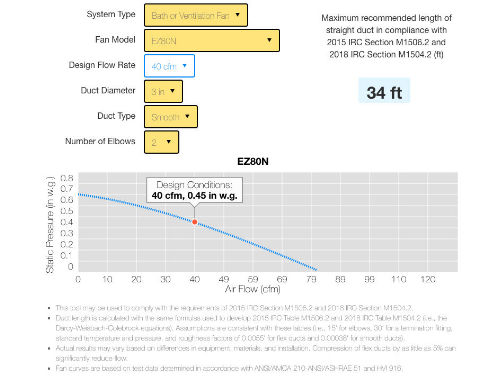
Broan Fan Model EZ80N can run up to 34 ft.
[Click to enlarge any image]
When we change the design CFM to 60 we see that with a 3" duct this fan WILL NOT WORK period.
When we then change the DUCT DIAMETER to 5 inches, the calculator says yeah, you're good, no limit.

Watch out: using these fan calculators you can quickly get in trouble: that means having a fan that won't actually work or that will give a fire hazard - if you do not watch every parameter you enter with great care. Some of the fan models will show "no limit" to duct length (that I question) but look again: the calculator may have changed the vent duct diameter from 3" up to 7" or 8".
Thanks for asking
Question: recommended minimum distance required between bath vent fan exhaust and outside main gas line and meter
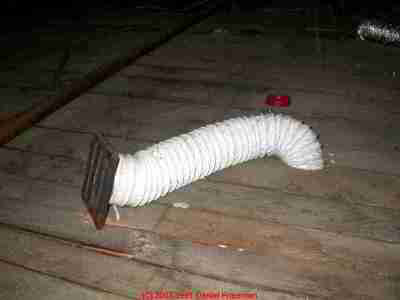
Is there a minimum distance from your outside main gas line and meter that a bathroom fan can be vented out to at the side of your house? - Lee
Reply:
Lee:
Above we quoted
Fantech recommends a minimum of eight feet of insulated flex duct between the exhaust inlet register or grille and the fan motor.
I haven't seen a gas code specification for the required clearance between a bathroom exhaust vent fan outlet and an incoming gas line or pipe at the building, perhaps because an exhaust vent opening should be venting only one-way: from the building interior to the outdoors. Second, gas piping should not be leaking, and if it is, you should smell the gas leak and repair it immediately.
If you are concerned that the exhaust fan flapper that should close to prevent back-drafts of outdoor air into the building could malfunction and admit leaking gas from an LP or natural gas pipe or from the gas vent found at an outdoor natural gas meter, if you match the TEN FOOT clearance distance required between an air conditioner air intake and an LP gas tank, since that is the largest clearance that applies for most residential building conditions you should be ok.
We discuss gas piping and gas tank, regulator clearance and various building features in our article titled "LP Gas Tank Inspection & Reporting " - you can find the article by searching InspectAPedia for that title.
Question: recommended maximum distance for horizontal bath vent duct routing
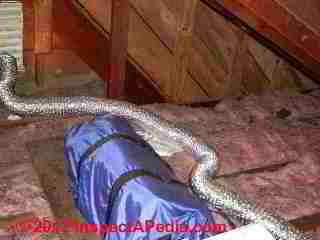
You note the best practice is to terminate the bath vent duct: horizontally through the building wall at a building gable-end wall (first choice), or if the gable end is too distant. what is a distance the would be within you recommendation. - DGB family
Reply:
Good question. Naturally we want to keep the fan duct run as short as possible. I reviewed various industry sources and did not see a maximum allowable distance, but typically we see it's 10 - 12 feet or less.
Longer duct runs provide more air resistance, a problem you can mitigate by using solid metal ducting or metal flex duct rather than the more sinuous plastic and wire flexduct often found in these installations.
The bath vent exhaust duct shown in our photo (above left) continued to snake across the building attic - too long, too many turns, too much up and down variation in slope - it was an ineffective installation that collected condensate inside the ductwork.
Reader Comments & Q&A
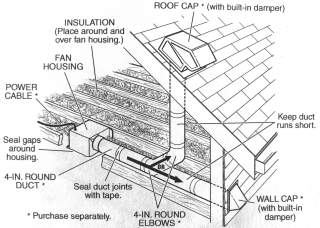 From the fan specs
From the fan specs
"Fan shall have corrosion resistant galvanized steel housing with four-point mounting capability. It shall be ducted to a roof or wall cap using 4" round ductwork."
Bottom line: a 4-inch exhaust duct diameter is perfectly permissible and will work fine as long as the CFM rate of the fan OR the length of duct run (including effects of elbows or bends) does not exceed what the manufacturer recommends. In those cases a larger duct may be the solution.
[Below at InspectApedia.com are] links to the installation guide and the spec sheet for this model. (the spec sheet also specifies 4" duct).
Thanks for the discussion as well!
- Broan AR-110 BATH EXHAUST FAN INSTALLATION MANUAL [PDF]
- Broan AR-110 BATHROOM EXHAUST FAN SPECIFICATIONS [PDF]
Chad
Certainly a manufacturer's instructions are most-important to follow.
I'd like to have a copy of that manual for review, and to see the manufacturer and the age of the product and its information.
Thank you for the helpful discussion.
Thanks for the reply. That is what is confusing to me. When I started to research maximum runs for ducting, I stumbled on to this site which has charts that indicate a fan with 100CFM can not use 4" ducting yet the installation manual for this 110 CFM fan never mentions any other ducting other than 4".
[Above] is an image from the manual. These are the only two places where ducting is shown or mentioned. The first is in this picture. The second is literally step 7 of the installation procedure that says "Connect 4 inch Round Duct". That's it.
Chad
There's no trouble finding an adapter between duct sizes, but we ought to start with a very careful review of the fan manufacturer's installation instructions. Comply with those specs on duct length, elbows, diameter, etc and you'll be ok, including use of a 4-inch duct, as you can also see in the tables above on this page.
In general a 4-inch exhaust fan vent an run
- 25 ft. if using flex duct
- 70 ft. if using smooth metal duct
- with a maximum of 3 elbows
- Table M1507.4 Prescriptive Exhaust Duct Sizing on the page above. Other sources vary slightly from these numbers.
I am finally finishing a basement bathroom that was originally roughed in when the house was built 11 years ago.
The size of the room calls for a fan rated at 85CFM. I have purchased a light/fan combo that is 110 CFM. The bathroom is at the front of the house, basically under the front porch, leaving me little options for venting at the nearest exterior wall due to the porch (and a wife who does not particularly care for a vent on the front of the house).
I believe I am going to have to run the vent to the side of the house which is approximately 18-20 feet from vent placement
The fan comes with a connection for 4" vent tube. Am I going to have to use an adapter to go up to 6" tube?
So connect 4" pipe to van, go up to 6" pipe, then go back to 4" at the connection to the exterior louvered cap?
PJ
Ask your local code inspector if she will accept your deviation from the loc as k code if you are following the manufacturer's instructions.
Generally a 4 inch flex duct can carry a fan exhaust for up to 25 ft.
Most codes require that.
How do the codes apply to Fantech fans, particularly where Fantech recommends their 4" flexible insulated pipe attached to a 110 CFM fan (the specs show that its max is actually 139 CFM).
I want to connect the vent in the bathroom to about 1 foot of rigid, then one 90 degree rigid elbow, then connect that to about 17' of Fantech's flexible duct (running vertically) before venting to the roof.
The codes here (Salt Lake City, UT - IRC 2015) say that I cannot even hook up a 110 CFM fan to 4" flexible pipe, but Fantech says that is exactly what I should do. I don't want to install the Fantech fan if the inspector is going to tell me it is not permitted.
FWIW, my bathroom has a window, so maybe I can just install it, even if it's not to code? Lastly, I've contacted Fantech, and they are totally unhelpful.
I should add that I only need about 60 CFM if I do the length, width, height calculation method, and the Fantech website says I need 64 CFM but does not provide any explanation for how that is calculated.
Anonymous and Curt: just check the total equivalent duct length after you've factored in elbows and other restrictions, to be sure the CFM will be adequate.
Is This Acceptable? The Powder Room is in the center of the first floor, without access to the exterior walls. However, we can run a 4" foam-core PVC pipe up through an insulated interior wall on the second floor, to the attic.
Once in the attic, we would run a 5' (heavily insulated) duct to an existing un-used roof vent (installed by roofers). The total pipe / duct length is approximately 17', with 3 elbows. The powder room is 25 sq. ft. (200 cu. ft.).
We plan on installing an exhaust fan with 70-80 CFM to quickly exhaust the air and to have a more powerful unit. Any advice, comments, suggestions, or warnings would be greatly appreciated. cjnsg@tds.net
Anon
4 baths but 3 fans - so I'll just deal with the 3 fans.
3 x 320 cfm = 960 cfm to be vented.
Your inline exhaust fan has to thus be have a 960 CFM capacity before allowing for losses due to duct size, bends, material, restrictions in air flow and duct length.
For that air volume 8" diameter vent ducts are close to their limit and 10" is indeed preferable.
The inline exhaust fan can go anywhere in that length when you figure that the forces it has to overcome include BOTH the losses on the fan's suction or inlet side AND the losses on the fan's outlet side. These are properly-termed resistance to air flow or SP or Static Pressure.
Kitchen and bath exhaust fan manufacturers give duct sizing charts for various air flow requirements, such as this
- EXHAUST DUCT VENT FAN SIZING CHART [PDF] from CaptiveAir Products, 4641 Paragon Park Road Raleigh, NC 27616 USA Tel: (919) 882-2410 Toll Free: (800) 334-9256 retrieved 2018/08/30 original source: https://www.captiveaire.com/CATALOGCONTENT/DUCTWORK/doc/Duct%20Size%20CAS.pdf?v=3072018
There you'll see that both CFM and actual air velocity have to be considered, so there is no single "right" answer.
Changing duct diameter from the diameter of the fan itself also introduces losses.
Separately there are rules about where the exhaust fan termination is placed:
501.2.1Location of exhaust outlets
The termination point of exhaust outlets and ducts discharging to the outdoors shall be located with the following minimum distances:
1. For ducts conveying explosive or flammable vapors, fumes or dusts:
30 feet (9144 mm) from property lines;10feet(3048mm)fromoperableopeningsinto buildings; 6 feet (1829 mm) from exterior walls and roofs;
30feet(9144mm)fromcombustiblewallsand operable openings into buildings which are in the direction of the exhaust discharge;
10feet(3048mm) above adjoining grade.
2. For other product-conveying outlets:
10 feet (3048 mm) from the property lines;
3 feet (914 mm) from exterior walls and roofs;
10 feet (3048 mm) from operable openings into buildings;
10 feet (3048 mm) above adjoining grade.
3. For environmental air duct exhaust:
3 feet (914 mm) from property lines;
3 feet (914 mm) from operable openings into buildings for all occupancies other than GroupU, and 10 feet (3048mm) from mechanical air intakes.
4. For specific systems:
For clothes dryer exhaust, see Section 504.4;
for kitchen hoods, see Section 506.3;
for dust, stock and conveying systems, see Section 511.2; and
for subslab soil exhaust systems, see Section 512.4.
I have 4 bathrooms back to back all three fans 320 cfm with an 8 Inch flexible duct attaching to a 10 inch metal duct non flex and runs thirty feet horizontal to the outside and want to install an inline exhaust fan how far from the end does this inline need to be is twelve feet from the end going to be sufficient?
Sorry Anil I don't understand the question. Why would a toilet require different venting when located in a pharmaceutical manufacturing plant?
What is the recommended formacitical manufacturing industry worker toilet exhuast system details
...
Continue reading at BATHROOM VENT DUCT MATERIALS or select a topic from the closely-related articles below, or see the complete ARTICLE INDEX.
Or see this
Building Ventilation Articles
- BATHROOM VENTILATION CODES SPECS - home
- BATHROOM VENTILATION DESIGN
- BATHROOM FAN ENERGY COST
- BATHROOM FAN HEAT RECOVERY
- BATHROOM FAN WIRING
- BATH KITCHEN VENT DUCT SHARING
- BATHROOM VENT AIR FLOW MEASUREMENT
- BATHROOM VENT AIR SUPPLY
- BATHROOM VENT CLEARANCES
- BATHROOM VENT CODES
- BATHROOM VENT DUCT LENGTHS
- BATHROOM VENT DUCT MATERIALS
- BATHROOM VENT DUCT ROUTING
- BATHROOM VENT DUCT INSULATION
- BATHROOM VENT DUCT SLOPE
- BATHROOM VENT DUCT TERMINATION
- BATHROOM VENT DUCT PROTECTION
- BATHROOM VENT FAN SIZING & NOISE RATINGS
- BATHROOM VENT DOWN in CATHEDRAL CEILING
- BATHROOM VENT DOWN THROUGH FLOOR / CRAWL AREA
- BATHROOM VENT UP THROUGH ROOF
- BATHROOM VENT CODES - ICC, IRC citations & Excerpts
- FAN ENERGY INDEX FEI
- HUMIDITY LEVEL TARGET
- KITCHEN VENTILATION DESIGN
- ODORS GASES SMELLS, DIAGNOSIS & CURE - home
- PRYNE VENTILATION FANS CATALOG 1950 [PDF]
- TRADEWIND KITCHEN VENT CATALOG 1950 [PDF]
- VENTILATION in BUILDINGS - home
Suggested citation for this web page
BATHROOM VENT DUCT LENGTHS at InspectApedia.com - online encyclopedia of building & environmental inspection, testing, diagnosis, repair, & problem prevention advice.
Or see this
INDEX to RELATED ARTICLES: ARTICLE INDEX to BUILDING VENTILATION
Or use the SEARCH BOX found below to Ask a Question or Search InspectApedia
...
Ask a Question or Search InspectApedia
Try the search box just below, or if you prefer, post a question or comment in the Comments box below and we will respond promptly.
Search the InspectApedia website
Note: appearance of your Comment below may be delayed: if your comment contains an image, web link, or text that looks to the software as if it might be a web link, your posting will appear after it has been approved by a moderator. Apologies for the delay.
Technical Reviewers & References
Click to Show or Hide Citations & References
Publisher InspectApedia.com - Daniel Friedman
Through The Wall Bathroom Exhaust Fan
Source: https://inspectapedia.com/ventilation/Bathroom_Vent_Duct_Lengths.php
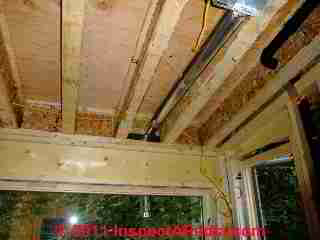

0 komentar:
Posting Komentar